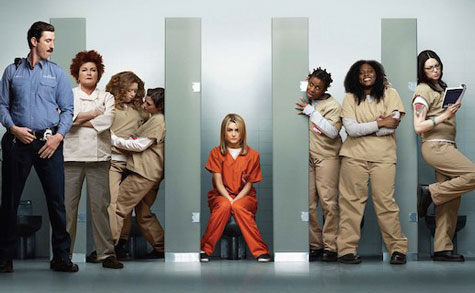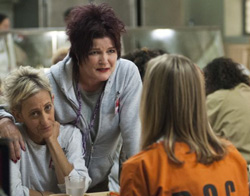 Orange Is The New Blackis to the Women In Prison flick what The Sopranos was to the mobster movie. It uses the form and tropes of the genre as a springboard into serious issues that the genre itself is usually content to avoid. I hope that doesn’t make Orange Is The New Black sound grim. It’s not. It’s as hilarious, humane, and compulsively watchable as any show on television right now.
Orange Is The New Blackis to the Women In Prison flick what The Sopranos was to the mobster movie. It uses the form and tropes of the genre as a springboard into serious issues that the genre itself is usually content to avoid. I hope that doesn’t make Orange Is The New Black sound grim. It’s not. It’s as hilarious, humane, and compulsively watchable as any show on television right now.
The irony of that last statement is that this show isn’t on television. Like last year’s breakout hit House Of Cards, the entire first season of OITNB has been released by Netflix and is available for instant streaming right now. When you start watching, you’ll want to clear your schedule for a few hours. Creator Jenji Kohan (the brains behind Weeds) knows how to keep you clicking to the next episode. The most commonly asked question around my living room the last couple of days: “One more?”
 The show revolves around Piper Chapman (Taylor Schilling) a soon-to-be-married yuppie who, as the show begins, is sentenced to 13 months in prison for once transporting drug money for her ex-girlfriend Alex (Laura Prepon). Now’s an especially bad time for Chapman to go to prison. She’s starting a business with her best friend Polly (Maria Dizzia) and is engaged to be married to an aspiring writer named Larry (Jason Biggs). One of the dramatic pistons of the series is that Chapman is trying to hold onto her life on the outside even as she is forced to navigate the new world inside Litchfield federal prison.
The show revolves around Piper Chapman (Taylor Schilling) a soon-to-be-married yuppie who, as the show begins, is sentenced to 13 months in prison for once transporting drug money for her ex-girlfriend Alex (Laura Prepon). Now’s an especially bad time for Chapman to go to prison. She’s starting a business with her best friend Polly (Maria Dizzia) and is engaged to be married to an aspiring writer named Larry (Jason Biggs). One of the dramatic pistons of the series is that Chapman is trying to hold onto her life on the outside even as she is forced to navigate the new world inside Litchfield federal prison.
The Women In Prison movie goes back to the reform films of the 1920s (scholar and filmmaker Oren Shai identifies DeMille’s 1922 Manslaughter as the first fully formed example of the genre) and developed through the classic film noir cycle in the 40s and 50s, reaching some kind of cultural apogee in the exploitation films of the 1970s. Orange Is The New Black fits seamlessly into this cinematic tradition, even while Jenji Kohan and her creative team use the long form nature of series television to deepen its thematic range.
As the culture of the prison is explained to Chapman on the first day by the affable Lorna Morello (Yael Stone), the inmates naturally divide themselves up. There are the white girls, the black girls, the Latinas, the Jesus freaks, the lesbians, the old broads. “It’s not racist,” Morello explains “it’s tribal.”
 “This ain’t Oz,” Chapman is told. While violence and sexual assault are distinct possibilities, they aren’t the norm. Negotiating the world of Litchfield is more about psychological warfare. Her first day inside, Chapman makes an innocent remark about the horrible prison food without realizing that she’s talking to Red (Kate Mulgrew) the inmate in charge of the kitchen—a mistake that nearly gets her starved to death. She adapts as quickly as she can. One of the tropes of the Women In Prison movie is the sadism of the guards. Chapman has to size up the people in charge: the lesbian-obsessed Healy (Michael Harney), the sweet natured Bennett (Matt McGorry), and the show’s master villain, the vile guard “Pornstache” Mendez (played with the sleaziness set to maximum by Pablo Schreiber).
“This ain’t Oz,” Chapman is told. While violence and sexual assault are distinct possibilities, they aren’t the norm. Negotiating the world of Litchfield is more about psychological warfare. Her first day inside, Chapman makes an innocent remark about the horrible prison food without realizing that she’s talking to Red (Kate Mulgrew) the inmate in charge of the kitchen—a mistake that nearly gets her starved to death. She adapts as quickly as she can. One of the tropes of the Women In Prison movie is the sadism of the guards. Chapman has to size up the people in charge: the lesbian-obsessed Healy (Michael Harney), the sweet natured Bennett (Matt McGorry), and the show’s master villain, the vile guard “Pornstache” Mendez (played with the sleaziness set to maximum by Pablo Schreiber).
The main strength of Orange Is The New Black is the way it uses its thirteen episode run to explore the lives of its characters. The audience expects Piper Chapman to have a back story, but the central insight of the show is that everyone has her own story. Many characters are introduced as types (the gangsta, the butch, the druggie), but to an admirable degree, no one remains a type. This is true even when Chapman’s old girlfriend Alex shows up to serve her own time in Litchfield. We’re ready for her to be a villain, but instead she turns out to be as fully a realized character as Chapman herself. Chapman wants Alex to be a villain, of course, because she needs someone to blame for her problems. The truth, in ways that the show has only begun to explore by the end of the season, is more complicated.
To a person, the cast is excellent. Taylor Schilling grounds the show as Chapman. At first, she seems so frail that we wonder if she’ll be able to make it. By episode nine, when she’s forced to confront the homophobic Healy, she’s found new reserves of strength. Schilling makes this change naturally. It’s not as if Chapman morphs into some hardass; she just finds the aspects of herself that will function most effectively in a new environment.
 And as Alex, Laura Prepon finally seems to have found the role she was born to play. Having shrugged off sitcoms, she’s hypnotically self-possessed here. When we’re told that Alex makes her living talking people into illegal activities, we believe it.
And as Alex, Laura Prepon finally seems to have found the role she was born to play. Having shrugged off sitcoms, she’s hypnotically self-possessed here. When we’re told that Alex makes her living talking people into illegal activities, we believe it.
Unfortunately, in a cast this size and this great, I don’t have the room to single out every performer who is amazing. Some highlights: the sarcastic Natasha Lyonne, back from her own real-life troubles with the law, as the world-weary Nicols; the positively lovable Yael Stone, as Nichols’s sometimes girlfriend Morello; Star Trek: Voyager’s Kate Mulgrew, who manages to be both stony and moving as the kitchen-dictator Red; effervescent Dascha Polanco as Diaz, an inmate in love with the good-hearted guard Bennett; and the touching Laverne Cox as Sophia Burset, a post-op transgender hairdresser whose story is either a triumph wrapped in a tragedy or a tragedy wrapped in a triumph—only future seasons will tell. One story I loved from this season involved an angry inmate named Janae Watson, brilliantly played by Vicky Jeudy. The evolution in our understanding of Watson is emblematic of how the show works. The furious young woman we meet in the first episode is gradually revealed, as we flashback through the heartbreaking story of her life, to be someone who never quite found an identity as a woman that didn’t bond her to a man—and the exact wrong kind of man at that. Everyone one of these characters is given a real story, and everyone of these actors is given a real character to play.
Orange Is The New Black has already been cleared for Season Two. Here’s hoping that Piper Chapman doesn’t get out of stir anytime soon.
See More from Criminal Element's Week Behind Bars.
Jake Hinkson, the Night Editor, is the author of The Posthumous Man.
Read all posts by Jake Hinkson for Criminal Element.

I neglected to mention that the series is based on the memior Orange Is The New Black by Piper Kerman.
Kerman is also the executive producer of the show and after leaving prison became an advocate for prison reform–she’s an interesting lady!
I really love this show. I’m on episode 8 and as you said, the most common question in my apartment these days is “can we manage one more before bed?” It’s so addictive, clever, smart, and really makes you think about these issues. Great show. I can’t really stand Piper as a character because she tends to say things without thinking, but that’s led to “How do you think you’d do in prison…” conversations with my roommates which are entertaining if not very realistic to how we would actually do. Thanks for the post!
The book was great. Now I need to watch Season 1.